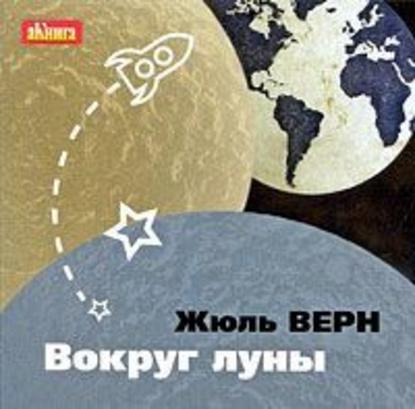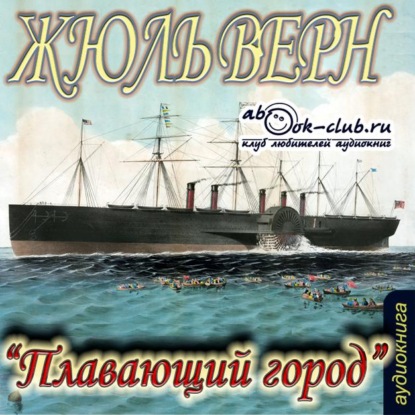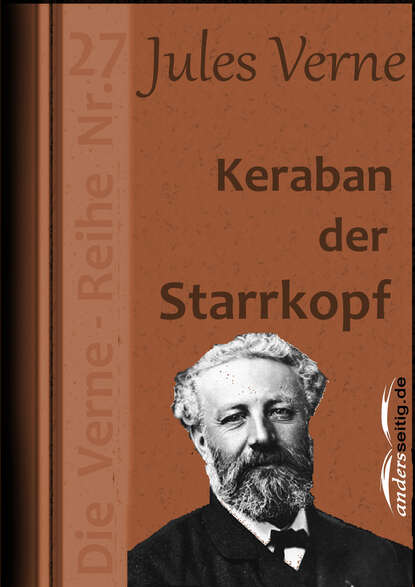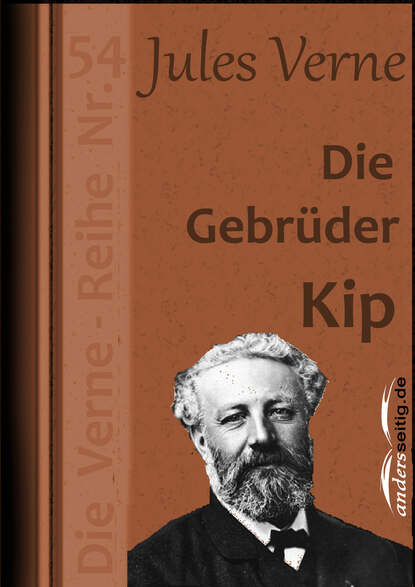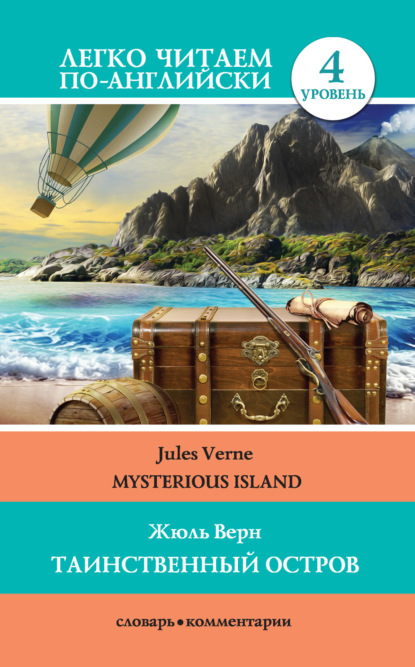
Полная версия:
Жюль Габриэль Верн Таинственный остров / Mysterious Island
- + Увеличить шрифт
- - Уменьшить шрифт

Жюль Верн
Таинственный остров / Mysterious Island
Jules Verne
MYSTERIOUS ISLAND
© Матвеев С. А., адаптация текста, словарь, 2018
© ООО «Издательство АСТ», 2018
Chapter I
“Are we going up again?”
“No. On the contrary; we are going down!”
“Worse than that, Mr. Smith[1], we are falling!”
“Throw over all the ballast!”
“The last sack is empty!”
“And the balloon rises again?”
“No!”
“I hear the splashing waves!”
“The sea is under us!”
“It is not five hundred feet off!”
“God help us!”
Such were the words which rang through the air above the vast wilderness of the Pacific[2], at 4 o’clock in the afternoon of the 23d of March, 1865.
It was a hurricane lasting without intermission from the 18th to the 26th of March. Covering a space of 1,800 miles, it occasioned immense destruction in America, Europe and Asia. Cities in ruins, forests uprooted, hundreds of shipwrecks, thousands of persons crushed to the earth or engulfed in the sea; such were the witnesses to its fury.
And while these catastrophes were taking place upon the land and the sea, something was enacting in the heavens.
A balloon, caught in the whirl of a column of air, spinning around as in some aerial whirlpool, rushed through space with a velocity of ninety miles an hour. Below the balloon swung a basket containing five persons.
The storm had been raging five days. The balloon had come from a great distance, the passengers, indeed, had been unable to determine the course, they could not calculate their position. Their vision could not penetrate anything, as the thick fog was under the balloon. Around them everything was obscure. The clouds were so dense that they could not tell the day from the night[3]. No reflection of light, no sound, no roaring of the ocean had penetrated that profound obscurity.
Meanwhile the balloon had risen to a height of 4,500 feet, and the passengers discovered that the sea was beneath them, and realizing that the dangers above were less formidable than those below.
The night passed in the midst of dangers. At dawn, the clouds rose high into the heavens; and, in a few hours more, the whirlwind had spent its force[4]. Now, however, it became evident that the balloon was again sinking, slowly but surely. The voyagers threw overboard the remaining articles which weighed down the balloon, the few provisions they had kept, and everything they had in their pockets. But it was evident that the gas was escaping, and that the voyagers could no longer keep the balloon afloat.
They were lost!
There was no land, not even an island, beneath them. It was a vast sea on which the waves were surging with incomparable violence. It was the limitless ocean. Not a ship was in sight.
In order to save themselves it was necessary for them to stop the downward movement. But in spite of all they could do the balloon continued to descend.
It was a terrible situation, this, of these unfortunate men. The gas continued to escape. Faster and faster they fell, until at 1 o’clock they were not more than 600 feet above the sea. The gas poured out of a rent in the silk. Unless some land was to appear before nightfall, voyagers, balloon, and basket would disappear beneath the waves.
It was evident that these men were strong and able to face death. Not a murmur escaped their lips. They were determined to struggle to the last second. The basket, constructed of willow osiers, could not float, and they had no means of supporting it on the surface of the water. It was 2 o’clock, and the balloon was only 400 feet above the waves.
Then a voice was heard, the voice of a man whose heart knew no fear.
“Is everything thrown out?”
“No, we yet have 10,000 francs in gold.”
A heavy bag fell into the sea.
“Is the balloon rising?”
“A little, but it will soon fall again.”
“Is there nothing else we can get rid of?”
“Not a thing.”
“Yes there is; there is the basket! Catch hold of the net[5], and let it go.”
This was, indeed, the last means of lightening the apparatus. The five passengers had clambered into the net around the hoop, and looked into the abyss below.
The balloon went up. But soon it began to descend again. It was impossible to repair the rent, through which the gas was rushing out.
At 4 o’clock, when the balloon was only 500 feet above the sea, the loud barking of a dog was heard.
“Top[6] has seen something! Land! Land!”
They saw a high land. But it was still far, and it would take an hour to reach it. An hour! They did not know whether it was an island or a continent, as they were uninformed as to what part of the world the tempest had hurried them. But they knew that this land must be reached.
At 4 o’clock it was plain that the balloon could not sustain itself much longer. It grazed the surface of the sea.
A half hour later the land was scarcely a mile distant. The balloon made a bound into the air. It rose 1,500 feet, then began to descend and soon fell upon the sand. The passengers, assisting each other, hastened to the ground.
The basket had contained five passengers and a dog, but only four had been thrown upon the shore. The fifth one, then, had been washed off by the great wave. His friends cried:
“Perhaps he is trying to swim ashore. Save him! Let us save him!”
Chapter II
They were neither professional aeronauts nor amateurs in aerial navigation[7] whom the storm had thrown upon this coast. They were prisoners of war and succeeded to escape. Their aerial voyage had lasted five days. How did it happen?
This same year, in the month of February, 1865, many officers were captured by the enemy and confined within the city. One of the most famous of them was a Federal staff officer named Cyrus Smith[8].
Cyrus Smith was a native of Massachusetts[9], an engineer by profession, and a scientist, to whom the Government had given, during the war, the direction of the railways.
He was thin, bony, lean, about forty-five years old, with heavy moustache[10]. His muscles showed remarkable firmness. He was as much a man of action as of study. He was highly educated, practical, clear-headed, and his temperament was superb. Cyrus Smith was also the personification of courage. He had been in every battle of the war.
At the same time with Cyrus Smith another important personage fell into the power of the Southerners[11]. This was no other than the honorable Gideon Spilett[12], reporter to the New York Herald[13]. He obtained exact information and transmitted it to the journal in the quickest manner, and belonged in the first rank of the reporters.
A man of great merit; energetic, prompt, and ready; full of ideas; soldier and artist; vehement in council; resolute in action; thinking nothing of pain, fatigue, or danger when seeking information; a master of recondite information of the unpublished, the unknown, the impossible. He was one of those to whom all perils are welcome.
He also had been in all the battles, in the front rank, revolver in one hand and notebook in the other, his pencil never trembling in the midst of a cannonade. Gideon Spilett was tall, forty years old or more. Sandy-colored whiskers encircled his face. His eye was clear, lively, and quick moving.
Cyrus Smith and Gideon Spilett knew each other only by reputation[14], but the two soon learned to appreciate each other.
Cyrus Smith had a devoted servant. This man was black, born of slave parents, whom Smith had freed. But the servant had no desire to leave his master, for whom he would have given his life. He was a man of thirty years, vigorous, agile, adroit, intelligent, quick, and self-possessed, sometimes ingenuous, always smiling, ready and honest. He was named Nebuchadnezzar[15], but he answered to the nickname of Neb.
All these people were in Richmond[16], and it was very difficult to get out. Nothing indicated an early release to the prisoners. The reporter had but one idea; to get out of Richmond at any risk. Many times, indeed, he tried the experiment, and was stopped by obstacles.
Meanwhile, the siege continued, and the prisoners were anxious to escape in order to join the army of Grant[17]; and among these was a certain Jonathan Forster[18], who was a violent Southerner. This Jonathan Forster had conceived the idea of passing over the lines of the besiegers in a balloon.
So a balloon was made and placed at the disposal of Forster and five of his companions. They were provided with arms and food. The departure of the balloon had been fixed for the 18th of March. However, on the morning of the 18th the tempest broke forth.
The balloon, inflated in the great square of Richmond, was all ready, but the weather was terrible. The night of the 19th and 20th passed, but the storm only developed in intensity, and departure was impossible.
On that day Cyrus Smith in one of the streets of Richmond met a man whom he did not know. It was a sailor named Pencroff[19], aged from thirty-five to forty years, strongly built, much sun-burnt, his eyes bright and glittering. This Pencroff had sailed every sea, and had experienced every kind of extraordinary adventure that a man could encounter. It is needless to say that he was of an adventurous nature. Pencroff, in the early part of this year, had come to Richmond on business, having with him Herbert Brown[20], of New Jersey[21], a lad fifteen years old, the son of Pencroff’s captain, and an orphan whom he loved as his own child. He also had but one idea: to get out. He did not hesitate to address Mr. Smith without ceremony:
“Mr. Smith, have you had enough of[22] Richmond?”
The engineer looked fixedly at the man who spoke thus, and who added in a low voice:
“Mr. Smith, do you want to escape?”
“How?” answered the engineer, quickly. “Who are you?” he demanded, in a cold voice.
Pencroff made himself known[23].
“Well,” replied Smith. “And by what means do you propose to escape?”
“By this idle balloon which is doing nothing, and is ready to take us!”
The engineer seized Pencroff by the arm and hurried him to his house. There the sailor explained his project, which, in truth, was simple enough. They risked only their lives in carrying it out. The storm was terrible, it is true; but a skilful and daring engineer like Smith would know well how to manage a balloon. He had seen many storms and he thought nothing of them.
Cyrus Smith listened to the sailor without saying a word, with glistening eyes. This was the opportunity! The project was very dangerous, but it could be accomplished. During the night, in spite of the guards, they might reach the balloon, creep into the basket, and then cut the lines which held it!
“I am not alone,” said Smith.
“How many would you want to take?” demanded the sailor.
“Two; my friend Spilett, and my man Neb.”
“That would be three,” replied Pencroff; “and, with Herbert and myself, five. Well, the balloon can carry six.”
“Very well. We will go!” said the engineer.
“Tonight, then,” said Pencroff.
“Tonight, at ten o’clock,” replied Smith.
Pencroff returned to his lodging, where he found young Herbert Brown. This brave boy knew the plans of the sailor, and he was ready to go with him.
The storm did not abate, the journey would be terrible. The engineer feared but one thing; that the balloon, held to the ground and beaten down under the wind, would be torn into a thousand pieces.
Evening arrived. Thick masses of fog passed like clouds low down over the earth. Rain mingled with snow fell. The weather was cold. A sort of mist enveloped Richmond. The streets of the city were deserted; it had not even seemed necessary, in such weather, to guard the square in which swung the balloon. Everything favored the departure of the prisoners!
“Bad weather,” said Pencroff, holding his hat, which the wind was trying to take off, firmly to his head.
At half past 9, Cyrus Smith and his companions came together at the basket. They had not been discovered. Without saying a word, four of them took their places in it, while Pencroff, under the direction of the engineer, unfastened the bundles of ballast. It took but a few moments, and then the sailor joined his companions. Then, a dog leaped with a bound into the basket. It was Top, the dog of the engineer, who had followed his master.
The storm burst upon them with frightful violence. The engineer did not dare to descend during the night. It was not until five days later that the breaking of the clouds enabled them to see the vast sea extending below them.
So of these five men, who started on the 20th of March, four were thrown, four days later, on a desert coast, more than 6,000 miles from this country. And the one who was missing was their leader, Cyrus Smith.
Chapter III
The engineer had been swept away by a wave. His dog had disappeared at the same time. The faithful animal tried to rescue its master.
“Forward!” cried the reporter, and all four, forgetting weakness and fatigue, began their search. Poor Neb wept with grief and despair. But Smith’s companions hoped to find him.
“Look for him!” cried Neb.
“Yes, Neb, and we will find him,” replied Spilett.
“Alive?”
“Alive!”
“Can he swim?” demanded Pencroff.
“Oh, yes”, responded Neb. “And, besides, Top is with him.”
The sailor, looking at the roaring sea, shook his head.
It was nearly 6 o’clock. The fog had risen and made the night very dark. The men went northward along the shore of that land upon which chance had thrown them. A land unknown, whose geographical situation they could not guess. They walked upon a sandy soil, mixed with stones. The little party was searching all the windings of the shore.
After a walk of twenty minutes the four men were suddenly stopped by a rock. They found themselves upon the extremity of a sharp point upon which the sea broke with fury.
“This is a promontory,” said the sailor, “we must turn back.”
“But if he is there!” cried Neb, pointing towards the ocean.
“Well, let us call again.”
And all together, uniting their voices, they uttered a vigorous cry, but without response. They waited, and tried once more. And again there was no answer.
Then they turned back, following the opposite side of the promontory over ground equally sandy and rocky. However, Pencroff observed that the shore was bold there, and the birds were less numerous.
But by following this direction they were walking towards the south, which was going away from that place where Smith had landed. Soon they found themselves again arrested by the sea, upon a high promontory of slippery rocks.
“We are on an island,” exclaimed Pencroff.
The words of the sailor were true. The castaways had been thrown, not upon a continent, but upon an island not more than two miles long.
This desert isle, covered with stones, without vegetation, desolate refuge of sea-birds, did it belong to a more important archipelago? They could not tell. It was necessary to wait until the next day to search for the engineer; who, alas! had made no cry to signal his presence.
“The silence of Cyrus proves nothing,” said the reporter. “He may be wounded, and unable to reply, but we will not despair.”
The reporter then offered to light a fire upon the point of the island, which would serve as a signal for the engineer. But they searched in vain for wood or dry branches. Sand and stones were all they found.
One can understand the grief of Neb and his companions, who were strongly attached to their comrade. It was too evident that they could not help him now, and that they must wait till day. Either the engineer had escaped, and was already safe upon the land, or he was lost forever. The hours were long and dreadful, the cold was intense. But the castaways did not think of sleep. They moved back and forth upon that arid island, constantly returning to the northern end, where they would be closest to the place of the catastrophe. They listened, they shouted, they tried to catch some call.
Once the cry of Neb was answered by an echo; and Herbert said:
“That proves that there is land not far to the west.”
The sailor nodded; he knew his eyes could not deceive him. He thought he had seen land, and it must be there. Meanwhile the sky was clearing slowly.
The night passed; and towards 5 o’clock in the morning the heavens began to brighten, though the horizon remained obscure.
“I feel the land,” said Pencroff, “it is there!”
The fog soon rose. A clear sun warmed the upper. At half past 6, the mist was nearly gone. The sea appeared, limitless towards the east, but bounded on the west by a high and abrupt coast.
Yes, the land was there! The island and the main land were separated by a channel half a mile wide. Into this current one of the party, without saying a word or consulting with his companions, precipitated himself. It was Neb. Pencroff called to him in vain. The reporter prepared to follow, but the sailor ran to him, exclaiming:
“Do you want to cross this channel?”
“Yes, I do,” replied Spilett.
“Well, then, listen to me a moment. Neb can rescue his master alone. If we throw ourselves into the channel we are in danger: this strong current can carry us out to sea by. You see the tide is going out. Wait, just wait a little.”
“You are right,” answered the reporter; “we will keep together as much as possible.”
Meantime, Neb was swimming vigorously in a diagonal direction, against the current. He was gaining towards the other shore. It took him more than half an hour to cross the half mile which separated the isle from the mainland.
Neb landed at the base of a high rocky wall, and clambered quickly up its side, and then disappeared behind a rock.
Neb’s companions fixed their eyes upon that land from which they were going to demand refuge. They ate some of the shellfish which they found upon the sands; it was a poor meal, but it was better than nothing.
The opposite coast formed an immense bay, terminated to the south by a sharp point. This point at its junction with the shore was abutted by high granite rocks. Towards the north, on the contrary, the bay widened, with a shore more rounded, extending from the southwest to the northeast, and ending in a narrow cape. Between these two points, the distance was about eight miles. A half mile from the shore the island, like an enormous whale, lay upon the sea. Its width was not greater than a quarter of a mile.
Before the Island, the shore began with a sandy beach strewn with black rocks. Beyond this rose, like a curtain, a perpendicular granite wall, at least 300 feet high and terminated by a ragged edge. This extended for about three miles, ending abruptly on the right, as if cut by the hand of man.
Upon the upper level of the coast not a tree was visible. To the right, however, and back of the smooth face of rock, some verdure appeared. Finally, distant towards the northwest about seven miles, shone a white summit, reflecting the sun’s rays. It was the snowy cap of some lofty mountain.
It was not possible to say whether this land was an island or a part of a continent. Gideon Spilett, Pencroff, and Herbert looked earnestly upon this land where they were to live, perhaps for long years.
“Well,” demanded Herbert, “what do you think of it, Pencroff?”
“Well,” replied the sailor, “there’s good and bad in it, as with everything else. But we will soon see. In three hours we can reach that shore, and we will see what we can do to find Mr. Smith.”
Pencroff was not wrong in his predictions. Three hours later, at low tide, Spilett and his two companions waded through the water, which was nowhere more than five feet deep. Herbert, where the water was too deep, swam like a fish; and all arrived without difficulty at the other shore.
Chapter IV
The reporter walked along the coast in the direction which Neb had taken some hours before, and disappeared quickly around a turn in the shore. Herbert wished to go with him.
“Stay, my boy,” said the sailor. “We must pitch our camp for the night, and try to find something more satisfying to eat than shellfish. Our friends will need food when they come back.”
“I am ready, Pencroff,” said Herbert.
“Good,” said the sailor. “We are tired, cold, and hungry; we need shelter, fire, and food. There is plenty of wood in the forest, and we can get eggs from the nests; but we must find a house.”
“Well,” said Herbert, “I will look for a cave in these rocks.”
“Right,” said Pencroff. “Let us start at once.”
They walked along the base of the rocky wall. But instead of going northwards, they turned to the south. Pencroff had noticed a narrow inlet in the coast. Now it was important to pitch the camp near the fresh water; in that part of the island, too, Smith could be found.
The rock rose 300 feet, smooth and massive. It was a sturdy wall of the hardest granite. About the summit hovered a host of aquatic birds, with long, narrow, pointed beaks.
Meanwhile Herbert noticed some rocks. On them lay hosts of bivalves. Herbert called to Pencroff, who came running to him.
“Ah, they are mussels,” said the sailor.
“They are not mussels,” said Herbert, examining the mollusks carefully, “they are lithodomes[24].”
“Can we eat them?” said Pencroff.
“Certainly.”
“Then let us eat some lithodomes.”
These lithodomes were oblong shell-fish[25], adhering in clusters to the rocks. They tasted like oysters; Pencroff and Herbert made a good meal of them.
Their hunger was allayed for the moment, but their thirst was increased by the spicy flavor of the mollusks. The thing now was to find fresh water. Two hundred feet further on Pencroff and Herbert reached the inlet, through which a little river was flowing with full current.
“Here is water,” said Pencroff, “and over there is wood. Well, Herbert, now all we need is a house.”
The river water was clear. Pencroff and Herbert went down between the rocks, into sandy corridors.
“This is just what we want,” said Pencroff. “These Chimneys will be our house. But first we must get together some firing.”
Herbert and Pencroff left the Chimneys, and walked up the left bank of the river. After a quarter of an hour’s walk, the two reached the elbow which the river made in turning to the left. From this point they saw a forest of magnificent trees.
“Good,” said the sailor, “I may not know the name of these trees, but I know they will help us to make a fire, and that’s the main thing for us.”
It was easy to gather the firewood; plenty of dead branches lay at their feet. The dry wood would burn rapidly. Herbert asked, how could two men carry such a load to the Chimneys.
“My boy,” said the sailor, “there’s a way to do everything. If we had a car or a boat it would be too easy.”
“We have the river,” suggested Herbert.
“Exactly,” said Pencroff. “The river will be our road and our carrier, too.”
They looked at the ocean. The sea was a watery desert. The coast, too, was desolate. Neither Neb, nor the reporter could be seen.
“Something tells me,” said Herbert, “that a person so energetic as Mr. Smith could not be drowned like an ordinary man. He got to the shore; don’t you think so, Pencroff?”
The sailor shook his head sadly. He never thought to see Smith again; but he left Herbert a hope.
“No doubt,” said he, “our engineer saved himself.”
As Pencroff and Herbert walked towards the west, their looks fell on the snowcapped mountain, which rose six or seven miles away. They saw a forest. Then from the edge of this forest to the coast stretched a plateau.
“Are we upon an island?” muttered the sailor.
“It is big enough,” said the boy.
“An island’s an island, no matter how big,” said Pencroff.



